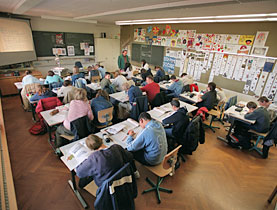Students give teachers a hard time online

Teaching staff at Swiss universities and technical colleges are facing a stern test – an online evaluation by their own students.
Website MeinProf.ch has been offering its services since December, and professors who are being hammered by the student body are complaining about the treatment being meted out.
Since its launch, the website has collected 2,500 student assessments and for professors there have been some surprises along the way. While teaching Swahili might earn you top marks, extolling the virtues of the computer age or management won’t necessarily result in a pass grade.
Jochen Bigus, a management professor at Bern University, is one of those whose result is less than stellar – an overall score of 2.2 points out of a possible five, and just 1.8 for the enjoyment factor. He admits he is a bit perplexed by the result.
“I think it is partly misleading since only six students from one class submitted an evaluation,” he told swissinfo. “In-house evaluations at the university involving more than 100 students gave me a better result.”
According to the university’s evaluation sheets, a grade of 3.4 would have been fairer, instead of 2.2. For the three other classes he gives, the marks would be between 4.2 and 4.5, which says Bigus, puts him among the best professors at the university.
Bigus puts his finger on one of the weak points of the online system. The number of assessments so far – while not a bad result according to the website’s backers – is still too low to make evaluations truly representative.
“We need at least ten times more,” admits Patrick Mollet, the head of MeinProf.ch. “And to be truly representative, we need to go beyond German-speaking students and reach out to the French and Italian-speaking communities.”
However, he defends the website’s approach, stating that this is the only way of publicly evaluating the performance of teaching staff.
“In-house evaluations remain confidential and usually wind up in a drawer somewhere where no one will see them,” he points out.
Pro and contra
Despite his personal score, Bigus doesn’t see the system as being inherently bad.
“It’s good for the students who can say what they think and it encourages the professors to do a better job,” he said. “But some students might take advantage of the system to denigrate teaching staff.”
For Mollet though, this type of problem is little more than a blip on the radar screen, as the original meinprof website in Germany has shown. “With enough assessments, unwanted evaluations are lost in the mass,” he said.
Some professors have complained about being openly evaluated and in some cases threatened legal action.
“There have been threats, but nobody has followed through yet,” said Mollet, who is confident that the website will not be taken to court.
Part of that confidence stems from statements made by the Federal Data Protection and Information Commissioner’s office. It recently said that the data on the website was not confidential and that the criteria for evaluating teaching staff were factual.
The other reason for this confidence is that in a recent court case in Germany, the judges sided with the website against a professor who had complained of defamatory statements made by students as part of the evaluation process.
The court ruled that the website managers had reacted in removing the offensive material and were not under any obligation to monitor data 24 hours per day.
Mollet says the real problem is that professors fear being openly evaluated, a whole new concept for them even though it has been taking place in other countries.
For Bigus, no matter how good or bad the results are, teaching staff will have to deal with this new fact of life. He just hopes that it won’t be misused in the future.
“These evaluations aren’t always beneficial for professors, because they might give the wrong impression – good or bad,” he told swissinfo. “The results could also have consequences later on, such as when decisions [by universities and funding agencies] about finance are reached.”
swissinfo, Scott Capper
MeinProf was created by five university students in Berlin in 2005 as an evaluation system for teaching staff across Germany.
Students can grade professors and lecturers according to seven criteria and provide comments. The different evaluation categories are fairness, support, study material, comprehension, enjoyment, workload and recommendations.
The website’s backers say that it is a service to students to help them choose the best courses and the best schools.

In compliance with the JTI standards
More: SWI swissinfo.ch certified by the Journalism Trust Initiative


You can find an overview of ongoing debates with our journalists here. Please join us!
If you want to start a conversation about a topic raised in this article or want to report factual errors, email us at english@swissinfo.ch.